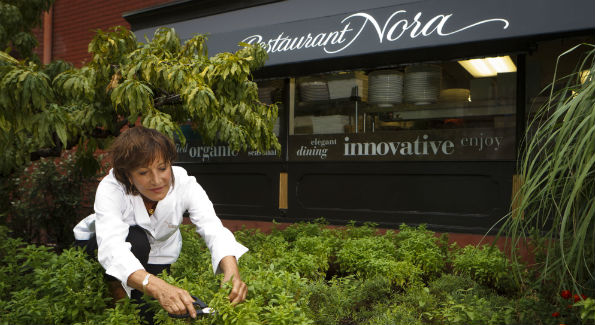Nora Pouillon’s memoir takes readers on a personal and historic culinary journey.
When Nora Pouillon arrived in Washington, D.C. from Austria in 1965, she was shocked by “how poorly people ate and how unhealthy they were.” There was no fresh produce in the supermarkets, as she was accustomed to seeing in Europe, and everything was prepackaged. Americans bought their groceries for the week instead of daily and shopped at large supermarkets instead of small shops. They rarely spoke to the butcher or bread maker in their town. Finding good food was a solitary endeavor.
But the 21-year-old newly married housewife didn’t sit back and accept this state of culinary affairs. Instead she took it upon herself to learn how to cook healthy foods for her family, at a time when “organic” wasn’t even close to being in vogue, and organic foods were difficult to find. Pouillon’s memoir, “My Organic Life” (Alfred A. Knopf, $26.95) written with Laura Fraser, takes readers from the pioneering chef’s childhood to the present day, from life on a farm in a war-ravaged country to the issues she faced as a young chef leaving an unhappy marriage to open up Restaurant Nora, the first certified organic restaurant in the U.S. Food and healthy eating is connecting thread throughout her life and in this memoir of a strong woman determined to raise awareness of food quality and the importance of sustainable and healthy eating.
Her cooking adventures, Pouillon says, began out of necessity and turned into a passion.
“Washington was really a culinary wasteland. I had to learn how to cook and I realized that cooking was actually the fun part of being a housewife. It wasn’t vacuuming or doing the laundry. With cooking, you need to be creative.”
Pouillon started hosting regular dinner parties for her new friends, budget-friendly meals out of their small Tenleytown apartment. These friends then started asking her if she could help them with their own dinners. This soon turned into cooking classes, a small catering business and eventually an offer to open a restaurant at the Tabard Inn. Soon she was in business full-time, leaving her role as housewife to pave the way as an organic chef and businesswoman.
Pouillon insisted that the Tabard Inn menu had to be done her way, with the ingredients of her choice, although at the time emphasizing “healthy” was often construed by the public as lacking flavor.
After leaving the Tabard Inn to open Restaurant Nora, friend and backer Sally Quinn advised her to tone down the health food talk, at least until the restaurant was established. “Don’t mention anything about being healthy and natural,” Quinn cautioned. “That sounds like hippie food, so unappetizing.”
Back when Restaurant Nora opened in 1979, the culinary climate in the US was far from sophisticated, but Pouillon made it her mission to take the organic movement mainstream. On her menus she listed the local producers who supplied the ingredients for her dishes; her selections changed regularly with the seasons. These practices are now commonplace in many restaurants, but at the time, it was a radical concept.
To those who say organic foods are too expensive to spend the extra money on, Pouillon offers a convincing argument.
“It depends on what you want to spend your money on. Americans are still in the mind-set that food has to be cheap, and that’s a killer. A lot of the health issues in this country are enormous and it is because of the food people eat,” Pouillon says, adding that she prefers to spend her money “on food and not on the doctor.” More pesticides are used in conventional foods than ever before, she adds, noting that the situation is getting worse because of genetically modified products.
Lucky for us, Pouillon and other organic food advocates are working to change that.
“When I discovered the difference between conventional and organic food, I decided to go into organic food because my father always said that health is the most important thing you have in your life,” Pouillon says. “No money in the world can buy it for you so you better preserve it.”
The article appeared in the September 2015 issue of Washington Life.





